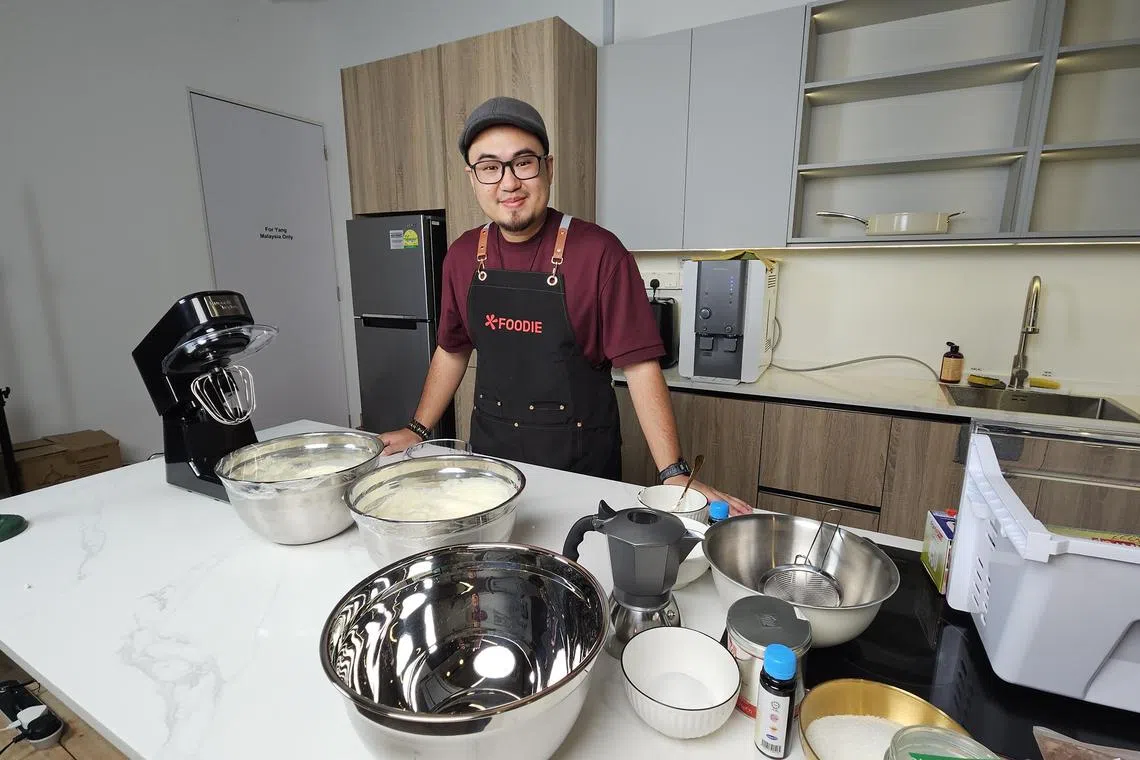Cooking up a storm: Malaysia’s popular Foodie online platform aims higher with IPO
Sign up now: Get ST's newsletters delivered to your inbox

Mr Nicholas Lim Pinn Yang, who co-founded Foodie Media with wife Ang Rui Mei in 2018, aims to raise capital by listing on the ACE Market of Bursa Malaysia.
ST PHOTO: LU WEI HOONG
Follow topic:
- Foodie Media has filed for an IPO on Bursa Malaysia, offering 250 million shares or 28.15 per cent of the company’s enlarged issued share capital.
- Starting with his Penang Foodie blog, Mr Lim leveraged social media content to grow followers and support SMEs.
- The company is expanding with new content including short cooking clips and micro-dramas.
AI generated
KUALA LUMPUR – As a young boy, Foodie Media’s head honcho Nicholas Lim Pinn Yang would wake up early and accompany his father, a frying-pan salesman, to the markets. Seeing his dad’s lively product demonstrations and interactions with customers taught him the art of selling, sparking an entrepreneurial spirit that nudged him towards a path that involved talking up good food.
“My father understood the importance of live demonstrations. To show the advantages of non-stick pans, he would fry popcorn for the kids, while also showing that fish wouldn’t stick in another pan, to attract the aunties,” Mr Lim told The Straits Times at his office in Bangsar on July 9.
“Now, with the rise of social media, thousands of people can watch online. It’s a big leap from the 20 or so shoppers who used to watch my father’s demos.”
The Penangite, 32, has come a long way since. From a humble food blogger offering free reviews nearly 10 years ago, he went on to be co-founder and chief executive officer of a digital media company with content that has amassed 40 million followers on social media.
It chalked up a net profit of RM7.45 million (S$2.24 million) on revenue of RM23.95 million for its latest financial year.
Set up in 2018, Foodie Media, with 70 employees, is mainly involved in the digital media publishing sector. It creates, produces and distributes content across platforms including Facebook, TikTok, Instagram and blogs.
Apart from platforms like KL Foodie and Penang Foodie, it manages 34 lifestyle-focused brands in South-east Asia, covering a wide range of topics beyond food and beverage to travel, lifestyle, property and sports.
Next up: Going public
Foodie Media wants to raise funds through an initial public offering (IPO) on stock exchange Bursa Malaysia to increase its workforce and acquire a live-streaming building, among other plans. It filed on June 23 to list on the ACE Market for emerging companies, offering 250 million shares or 28.15 per cent of the company’s enlarged issued share capital.
The IPO is touted as a first for a Malaysian digital media company producing food-related content, and the company will join established listed players in the sector such as Star Media Group, Catcha Digital and Rev Digital, a subsidiary of listed Media Prima.
Star Media Group controls The Star newspaper and two radio stations, while Catcha Digital operates social media portals. Media Prima is the country’s biggest integrated media group with TV and newspaper assets.
Mr Lim ventured into food-writing by launching the Penang Foodie blog in 2016, with one of the earliest free F&B reviews on the island widely known as Malaysia’s foodie paradise.
Recommendations for “Penang’s Best Breakfast” and the island’s “Top 10 Nasi Kandar” stalls gradually grew followers for the blog to 1,000 on Facebook in the first year.
The rise of short videos was a pivotal moment for Mr Lim and his team in 2018.
Turning blog articles into video slide shows was a hit.
The first slide show, Top 10 Street Foods In Penang, garnered 15,000 shares on Facebook, far surpassing the 300 shares typically seen for written reviews.
That gave Mr Lim the confidence to shoot his first outdoor video, featuring a burger stall, without charging the owners for the effort and resulting publicity.
“I was hesitant to appear on camera, but we still went ahead. A day after the video was published, it received over 20,000 views, and there was a long queue at the burger stall,” he recalled.
“I’m happy to provide value for clients, support small and medium-sized enterprises (SMEs), and grow our followers.”
Foodie Media has benefited from the digital media advertising boom in Malaysia.
The compound annual growth rate (CAGR) for such advertising rose by 11 per cent from 2019 to 2023, reaching RM2.37 billion, according to the IPO prospectus.
In contrast, traditional media recorded a negative CAGR of 0.2 per cent over the same period, despite reaching a value of RM5.1 billion in 2023.
During the downturn caused by Covid-19, Mr Lim managed to keep his team intact by earning affiliate income through e-commerce platforms. The recurring Malaysian food content not only helped ease the homesickness of sojourners, but also increased followers on social media by 40 per cent between 2020 and 2022, said Mr Lim.
Ideas are brewing for fresh content which drives website traffic and increases user engagement.
A new series, titled Cooking For Colleagues, landed in May. Episode 1: Fillet-O-Fish, a one-minute clip, received over 6,000 likes in the first month on Instagram.
The company is moving into live-stream sales and trying its hand at producing and distributing drama shorts, said Mr Lim.
In Malaysia, live-stream sales are thriving, as leading e-commerce platform Shopee’s numbers show.
As at end-2023, over one million Malaysians had registered to stream on Shopee Live, which lets viewers watch product-related content and interact directly with sellers.

KL Foodie editor and host Mr Josh Wong-Tendahal prepares ingredients for the third episode of Cooking for Colleagues, which is inspired by popular Korean-American food content creator POV Husband.
ST PHOTO: LU WEI HOONG
That year, 80,000 sellers boosted earnings by 25 per cent from the previous year, while live-stream orders grew 500 per cent over the same period.
Popular Malaysian food influencer and entrepreneur Khairul Aming credited 70 per cent of his sales, or RM42 million, in 2024 to live-streaming two best-selling Kelantan products, dendeng nyet berapi (spiced beef jerky) and sambal nyet (dry sambal or chilli paste).
Micro-dramas, or short-form video series typically spanning one to two minutes per episode, could fill a gap in a potentially lucrative market, given today’s shorter attention spans.
“In the past, we used to sit down with our parents to watch TV at 8pm, but now audiences are shifting to ultra-short dramas,” noted Mr Lim.
“We recently collaborated with a third-party video production house to promote the China-based milk tea brand Chagee through a short drama titled Di Sebalik Permata (Behind The Gem).”
The Economist estimates the market for these micro-dramas could reach a valuation of US$14 billion (S$17.9 billion) in China alone by 2027.
But Foodie Media will continue to rely on culinary storytelling to engage its followers – as seen in its organic or ad-free content featuring TBX The Baking Xperiment cafe in Subang, Selangor, interviewed by KL Foodie on July 4.
The cafe’s new recipe, Tapai Tiramisu – made with fermented rice – garnered 623,000 views on social media as at July 11.
For Mr Lim, the advent and rise of digital media enables street vendors and SMEs to overcome the physical limitations his father once faced.
“When it rained, I felt sorry for my dad as he couldn’t run his stall without sales (because there were fewer customers owing to bad weather). Now, with online markets, the sky is the limit.”


